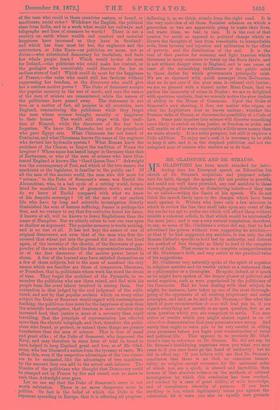THE DUKE OF SOMERSET ON THE POLITICIANS.
NO man in English politics polishes an exaggeration like the Duke of Somerset, and no man formulates a false axiom with greater clearness of expression. His denunciation of the Captain in 1871 as a vessel that " sat the water like a duck, and went down like a diver," though a mere epi- gram, had a distinct and most injurious effect on opinion about ironclads; and his speech at Exeter on Monday will help directly to confirm one of the falsest of English ideas, the belief that the men who apply science to "practical" ends —the engineers and telegraphists and machine-composers- have done more for mankind than all the politicians. This belief, which with many men rises to a creed, which has affected the course of all education, which draws away some of the noblest minds from politics, and which has, in some places, notably the Indian Empire, perverted the efforts of a generation of statesmen, could hardly be de- fined more sharply or with greater clearness of outline than by the Duke of Somerset :—" Let us," he says, " compare the two, the politicians and the men of science. Let us compare the works of Watt, Arkwright, Steven- son, Woollaston, Davy, Faraday, with the works of politicians, and ask which have done most for the civilisa- tion and improvement of mankind. Just look to what the steam-engine has done—what it has added to the power of England, what it has added to the wealth of England, to the civilisation of England by sea and by land, in the depth of the mine and the manufactory Look at that galaxy of high names that come down for centuries past. Compare them with the names of politicians who have passed away and are forgotten. But these men last, and their records last for ever. They are the glory of the nation, the benefactors of mankind." So completely have Englishmen become impressed with the grandeur of modern successes in the application of scientific discoveries, that one-half of all who read these words will accept them without a thought, yet they contain one of the most demonstrable and yet one of the most danger- ous of intellectual falsehoods. They are not true, even if we concede that the production of wealth or the increase of comfort ought to be the tests by which to try the progress of mankind. The politician who founds a nation, with its distinctive life, and special aim and separate develop- ment, does more to make that nation great than the engineer who opens its communications. Washington did more for America than Fulton. The lawgiver who establishes social order does more to promote the growth of wealth than the man who invents a new method of working mines, or dis- covers a new application of steam, or suggests a more perfect method of transmitting thought. Simon de Montfort, when he summoned the burgesses, did more to make England flourish than Arkwright, when he worked oat his spinning- jenny. The nobles who called over William the Deliverer did more for the freedom of mankind than. Wheat- stone has accomplished for their intelligence ; and the Duke of Somerset's own ancestor, the man who rushed unbidden out of pride and patriotism into a Cabinet Council, and compelled the final exclusion of the Stuarts, did more for progress than Newton when he demonstrated gravitation. We question if Arkwright did so much to increase the national wealth as Peel when he introduced free trade, and are quite certain that he did much less towards reducing the sum of human misery. Wilberforce has made more men directly happy than Watt has ever done, and Romilly added more to wealth by giving it security, when he abolished the code of blood, than Sir H. Davy ever did by reducing the average slaughter of the coal-miners. All honour to Watt and Woollaston, to Stephenson and Wheatstone—a group with which we decline to class Arkwright,—but it is to the poli- ticians they owe the possibility of success, the security, and the peacefulness, the institutions, and the manners which alone have made their discoveries fruitful to the world. What is the value of a telegraph without order, of a railway when the right of private war exists, of a Davy lamp without a population to buy coal, or of any manu- facturing invention whatever without use subtle and strong political arrangements which make it possible for a man to hold a property in a thought ? Put up a telegraph in Arabia, or a railway in Beloochistan, or a steam-engine in Borneo, and what is the value of those marvellous products of human skill as compared with the value, the actual cash-value,
of the man who could in those countries restore, or found, or ameliorate, social order Withdraw the English, the political class from India, and in a week what would her railways and telegraphs and lines of steamers be worth ? There is not a country on earth where wealth and comfort and material happiness have increased as they have in Scotland ; and which has done most for her, the engineers and the contractors, or John Knox—as politician we mean, not as divine—who substituted democracy for feudalism, and bade her whole people learn Which would to-day do most for Ireland,—the politician who could make her content, or the geologist who conceivably could discover for her an endless store of fuel? Which could do most for the happiness of France,—the ruler who could still her factions without suppressing her freedom, or the discoverer who could give her a costless motive power The Duke of Somerset accepts the popular memory as the test of merit, and says the names of the men of science are remembered, while the names of the politicians have passed away. The statement is not true as a matter of fact, all peoples in all countries, save England, remembering the politicians while they forget the men whose science brought security or happiness to their homes. The world still rings with the tradi- tion of Nimrod, while the discoverer of fire has been forgotten. We know the Pharaohs, but not the priesthood who gave Egypt arts. What Chinaman has not heard of Confucius, and what Chinaman knows the name of the engineer who devised her hydraulic system ? What Roman knew the architect of the Cloacae, or forgot the tradition of Numa the lawgiver ? Whose name has lasted longer in Germany than that of Barbarossa, or who of the men of science who have illus- trated England is known like "Good Queen Bess ?" Arkwright was the contemporary of Peel, and which of the two names, the machinist or the legislator, is familiar to the public ear? Of all the men of the ancient world, the man who did most for " science," in the Duke of Somerset's sense, was Euclid the Alexandrian, who, in a bad cycle of a rotting world, formu- lated for mankind the laws of geometric truth ; and what do we know of Euclid compared with what we know of his despotic sovereign ? Of all the men of our modern life who have by long and scientific investigation directly diminished the sum of human suffering, Jenner is perhaps the first, and we venture to say that five centuries hence his name, if known at all, will be known to fewer Englishmen than the name of Hampden. But we utterly refuse to rest our case upon so shallow an argument. The popular memory is worth nothing, and is no test at all. It has not kept the names of one of original discoverers, not even that of the man who first dis- covered that wheat put into the ground did not die but lived again, of the inventor of the chariot, of the discoverer of gun- powder, of the man who called the first representative assembly, or of the first discoverer of the motive power latent in steam. A few of the learned may have satisfied themselves on a few of these subjects, but to the mass of mankind the only names which are familiar are those of conquerors, liberators, or Founders, that is, politicians whose work has stood the strain of time. They forget the architect of the Pyramids, to re- member the politician who saw them raised, and fled with his people from the cruel labour involved in raising them. Our contention is, that judged by the cool judgment of the culti- vated, and not by that popular acclaim which on every other subject the Duke of Somerset would regard with contemptuous loathing, the politician does more for the happiness of man than the scientific investigator, that freedom is more valuable than increased food, that justice is more of a necessity than rapid travelling, that the principle of representation has effected more than the electric telegraph, and that, therefore, the politi- cians who found, or protect, or extend these things are greater benefactors than the men of science. This is true of small and great alike ; of the Duke of Somerset, who improved the Navy, and may therefore in some hour of trial be found to have helped to keep England great and free, as of Mr. Glad- stone, who has liberated a nation from the tyranny of caste. We affirm this, even if the respective advantages of the two classes are to be estimated, like the advantages of two machines, by the amount they can add to the actual cash balance. The blunder of the politicians who thought that Democracy could be stamped out in France by fire and sword, cost us more in cash than Arkwright ever gave. Let no one say that the Duke of Somerset's error is not worth refutation. There is no more dangerous error in politics. So fast is the belief of which the Duke is the exponent spreading in Europe, that it is affecting all progress,
deflecting it, as we think, utterly from the right road. It is the very root-idea of all those Socialist schemes on which a generation or two are apparently going to waste their liven, and waste them, we fear, in vain. It is the root of that passion for social as opposed to political change which so diverts the thoughts of men from remediable to irremediable evils, from tyranny and injustice and militarism to the effect
of poverty, and the distribution of the soil. It is the root of that passion for economy and light taxation which threatens in many countries to break up the State fabric, and is not without danger even in England, and is one cause at least of the astonishing indifference of the public mind to those duties for which governments principally exist. We are so charmed with quick messages from Melbourne, that we do not care if the poor man is refused civil justice ; we are so pleased with a tunnel under Mont Cenis, that we pardon the immunity of crime in Naples ; we are so delighted with spectrum analysis, that we scarcely notice the slow decline of ability in the House of Commons. Upori the Duke of Somerset's own showing, it does not matter who reigns, or what the Legislature does or leaves undone ; whether the Premier talks of Homer, or discusses the possibility of a Code of Law. Some pale inquirer into science will discover something more likely to enrich us than justice or freedom or order, and will enable us all to waste comfortably a little more money than we waste already. It is a noble prospect, but still it requires a little addition. To enjoy one's cash it is necessary to be able to keep it safe, and it is the despised politician and not the eulogised man of science who enables us to do that.



































 Previous page
Previous page